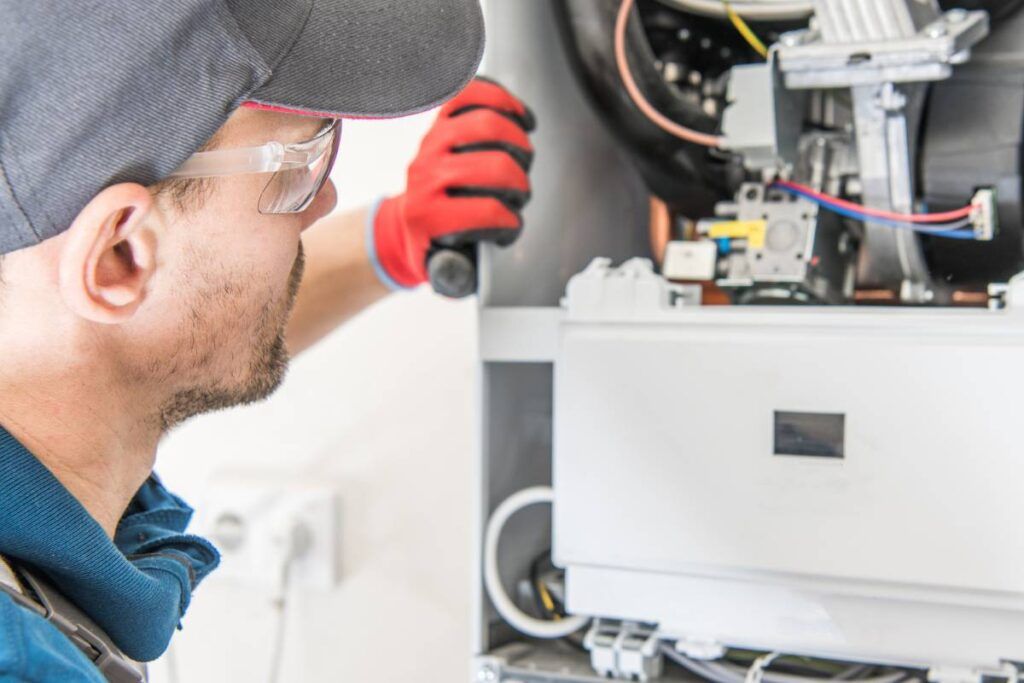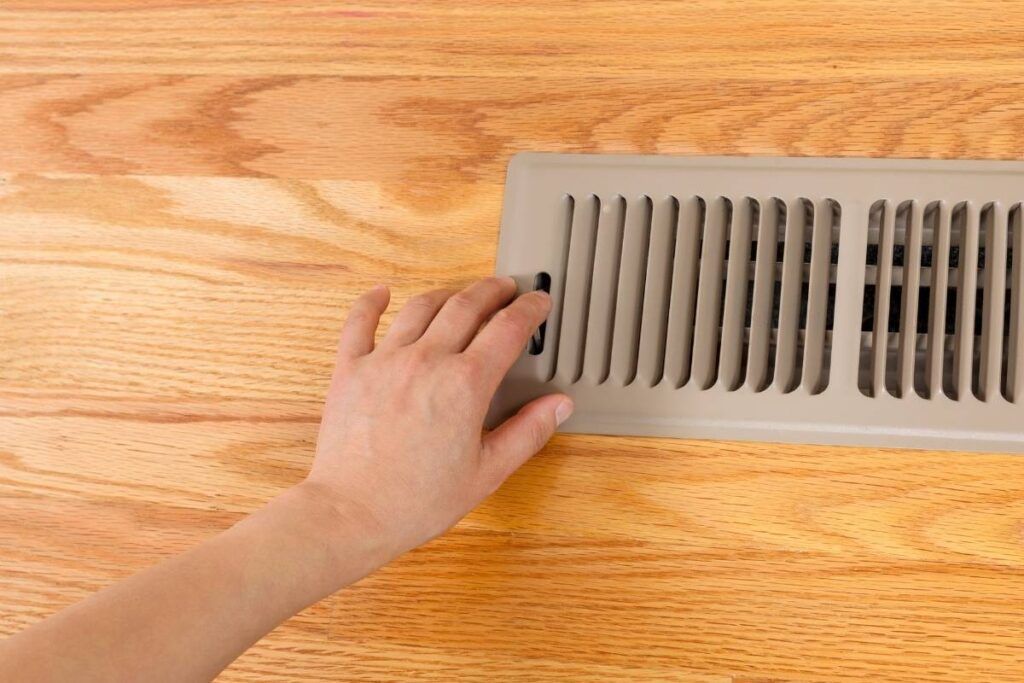A furnace is useful in winter as it releases warm air into the house. The air treated inside the furnace should be odorless or pleasant. But if the smell is weird, it indicates something is wrong.
A furnace smells due to electrical issues, overheated motor, cracked heat exchangers, dirty air filters, sewer traps, dirty ductwork, etc. Hire an HVAC team for electrical issues, overheated motors, and cracked heat exchangers. Clean the filters, traps, and ductwork every few months.
Not all types of smell are hazardous. Some furnace smells might be weird, but they are not dangerous. This article will highlight and explain the reasons behind the furnace’s weird smell and how to troubleshoot the problem.

Check out our list of top-handpicked products for all your electrical, appliance, and HVAC system needs to keep your home running smoothly.
This post includes some affiliate links.A furnace releases a chemical smell.
Furnaces emitting a chemical smell can be due to several reasons, like improperly vented appliances, combustion byproducts, electrical issues, or ignition and blower motor issues.
1. Improperly vented appliances
Whenever a furnace starts, it will emit a chemical smell.
The reason is an improperly vented system.
When you turn on the furnace, it casts fumes that smell like chemicals.
Improper venting will lead to the accumulation of carbon monoxide in your room.
So, while turning on the furnace, you must ensure enough ventilation so the furnace fumes can easily escape your house.
You can do this by installing a window or door in the furnace or having some special vent.
Make sure to talk to a technician for the furnace repair if you find any strange odor and are confused about it.
2. Combustion byproducts
A furnace smelling like a chemical suggests a problem in the combustion process.
When furnaces burn by propane or natural gas, they produce water vapor, carbon dioxide, and other gasses.
These are combustion byproducts.
These byproducts will cause a chemical scent.
If you are uncomfortable and worried about the smell, turn off your unit and call an HVAC team to look into the matter.
To avoid dangers, schedule regular annual maintenance of your unit.
3. Electrical issues

The furnace wiring can overload and release a chemical or burning smell.
If the furnace motor gets overloaded, it will produce a chemical odor, which can also lead to a fire hazard.
Turn off your unit and hire an HVAC team to look into the matter.
4. Cracked heat exchanger
A cracked heat exchanger will release toxic carbon monoxide, which smells like a chemical.
A heat exchanger can crack over time due to poor maintenance, rust, or erosion.
When this happens, you and your family will be at risk.
Putting a carbon monoxide (CO) detector in your furnace room will let you know whether the furnace is releasing gas.
When you get the smell and detect the CO release, turn off your furnace, open the doors and windows to let the gas out, and call a professional to replace the heat exchanger.
5. Ignition problem and blower issues
When a furnace does not ignite well, it will lead to a gas leak, therefore, the chemical smell.
Another reason is a faulty blower motor. When the blower is at fault, the air cannot distribute properly.
As a result, the furnace will work harder to give you the desired temperature and overheat, creating a chemical-like smell.
Turn off the furnace and call an HVAC expert to handle the matter.
The furnace releases a rotten egg smell.
A furnace releasing a rotten egg smell is quite problematic. Here are some common reasons:
6. Cracked components

When your heat exchanger cracks, there will be a hole that releases a putrid smell similar to rotten eggs or formaldehyde.
It would be best to call an HVAC to replace the component as soon as possible. Otherwise, the problem can lead to a fire outbreak.
7. Dampness
Dampness settles over your unit if your furnace is near a damp location.
When you light up the furnace, the unit becomes hot, the moisture from the dampness evaporates, and creates a rotten egg smell.
But there is no harm in the smell because it will fade if the furnace burns for a long time.
8. Excessive dust
Dust builds up inside the furnace when it remains dormant in the summer.
When you turn it on in the winter, this accumulated dust will burn and release a rotten smell.
But it should fade after your furnace runs for some time.
To prevent it, clean your furnace before the winter strikes your region.
9. Gas leaks
The natural gas the furnace uses is laced with sulfur which can give you a rotten egg smell.
Adding sulfur to the gas helps alert house owners during gas leaks.
Call an HVAC expert to fix the matter if you encounter this smell.
10. Contaminated air intake

Most of the recent furnaces take in the air outside your house.
So, any other smell close to the furnace’s intake system will make the furnace the same odor.
For example, if your furnace smells of rotten eggs or sewer, the furnace will take in the smell.
So, when your furnace releases the smell, it is due to the rotten smell or sewer opening near your house.
There is no harm in it.
As the rotten smell from the air disappears, your furnace will stop producing the rotten egg.
11. Mold
Mold can sometimes smell similar to the rotten egg smell.
If your furnace or the ducts suffers dampness, they will grow mold over time.
It occurs when the humidity inside your house is too high.
When you turn on the furnace, your unit will spread a rotten egg smell.
But over time, the smell will vanish.
Mold can be dangerous for your health, especially if you suffer from lung disease or asthma.
The oil furnaces are more prone to releasing the rotten egg smell due to mold.
Call an HVAC expert to get rid of the mold.
12. Vent contamination
Some prevalent vent contamination is due to pet hair and urine odor, which can release a rotten egg smell.
Look around the vent openings for pet excretion and take care of the mess to resolve the smell problem.
The furnace releases a burning smell.
Be it a gas furnace or an electric furnace, a burning smell from the unit is stressful.
Sometimes, the smell may be normal in certain situations.
Still, in other cases, it indicates a serious issue that requires immediate addressing.
Here are some common reasons:
13. Dirty air filter

Dirty air filters are a major reason behind a burning smell.
Dust, fur, hair, lint, and other dirt can block the filter pores.
When the air handler forces the air through the filter, this dirt and debris will become hot enough to burn, which releases a burning smell.
Changing the filters every 3 to 4 months can prevent the burning smell.
Thick filters take more time to become dirty than thin ones.
So, instead of waiting for 3 to 4 months, check your filter every month and change it whenever required.
14. Incomplete combustion
The burner flame must be consistent in a gas furnace.
A burner needs fresh air to maintain the combustion procedure.
The process further needs a consistent supply of gas.
Suppose the gas supply valve, burner, pilot, ignition, or airflow creates any problem.
In that case, it will lead to an incomplete combustion process, leading to soot and ash.
When the burner ignites, this soot and ash will burn and make the furnace release a burning smell.
You may call an HVAC to look into the components causing incomplete combustion and fix them soon.
15. Dirty combustion chamber
When you do not use the furnace for a very long time, like 6 months or more, the combustion chamber will have a layer of dust particles.
The dirt will be mostly in the burner and the heat exchanger.
When you turn the unit, it will begin its first heating cycle, and the dirt particles will start burning, releasing a burning smell.
The smell will fade after some time of the unit’s running.
16. Dirty ductwork

When the furnace is not in use, along with the unit, the ducts will collect dirt and debris over time.
The dust will become hot and burn whenever you turn on the unit, releasing a burning smell.
It should fade after some time. If not, turn off the unit and call an HVAC.
17. Electrical malfunctioning
Gunpowder or burning sulfur smell will be due to the overheated components inside the furnace, which may start burning over time.
This situation is an emergency.
Turn off your furnace and contact the HVAC immediately to address the issue.
Do not turn on the unit until the components get repaired.
The furnace releases a burning plastic smell.
The furnace releasing a plastic smell is quite weird.
Let’s look at some common reasons:
18. An overheated circuit board and wires or plastic inside the unit
The circuit board and wires of the furnace will have plastic insulation.
Overheating can melt this plastic insulation, therefore causing a burning plastic smell.
Whenever you get a plastic smell, please turn off your furnace and check the reason behind it.
If it is due to overheating, you must call an HVAC to fix the insulation.
19. Plastic items stuck inside the furnace, duct, or vent

Plastic items can reach your house’s vent, ductwork, and furnace.
Whenever you turn on the furnace, these plastic items will become hot enough to start burning, thus the melted plastic smell.
Turn off the unit and clear the plastic items from the vent, duct, or furnace. Call an HVAC if needed.
Keep such items away from your vents, furnaces, and ducts.
20. Furnace protective finish
A specific furnace protective finish is applied to some areas of the furnace to prevent rust and erosion.
The coating may sometimes come in contact with the heat, and the gas will be released by the furnace, resulting in a burning plastic smell.
The coating will release the smell for the first few times after turning on the furnace.
You will need a technician if the smell does not disappear permanently after some days.
21. Burned filters
A clogged filter can sometimes release a plastic-burning smell when too much dirt accumulates in the filter.
Due to the dirty filter, the blower motor will work too much to release the heated air, overheat it, and release a burning plastic smell.
22. Faulty heat exchanger

The heat exchanger is a metal shield between the blower and the combustion chamber.
It helps distribute the hot air from the furnace to the house through the ductwork.
If the heat exchanger breaks, it will release a plastic-burning smell.
Sometimes, the smell may also resemble chemicals or rotten eggs.
With a cracked heat exchanger, your whole heating system will overheat, which can lead to the melting of the plastic insulation of the wires and fire hazards.
Turn off the unit and call an HVAC to replace the heat exchanger.
23. Loose furnace parts
A furnace contains several components, each of which has individual responsibilities.
Together they make and emit warm air throughout your house.
A dislodged component can melt the plastic wire insulation and release a burning plastic smell.
However, you may not have this problem with your new system.
The old ones are more prone to the burning plastic smell.
You need to call an expert to fix the loose parts and rule out the problem quickly.
You can also tighten the loose parts if you have the proper tools.
Furnace releasing sewer smell.
When your furnace releases a sewer gas smell, the problem is with your sewer lines, not the furnace.
24. Dry sewer trap or sewer leak

A dry sewer trap will release a bad sewer smell.
You must put some water down the basement floor drain to fix the problem.
If the smell does not fade, there might be a sewer leak.
You need an expert to repair the leakage.
The furnace releases a musty smell.
A musty smell is probably due to mold and mildew inside the unit or ducts.
25. Dirty ductwork
The furnace uses the ducts to release the air throughout your house.
Over time, moisture and dirt can gather inside your duct and encourage mold and mildew growth.
Whenever you turn on the furnace, it will release a musty smell.
The air released from the duct will have mold spores.
If inhaled, you will soon suffer from allergies.
The air is dangerous for people with lung disease and asthma.
Call an HVAC team to clear the ducts.
26. Dampness
Furnace dampness will release a musty smell.
When a furnace is near a damp or humid location, the dampness will settle inside and around the furnace.
So, when you turn on the unit, you get a stale smell.
Over time, the dampness can lead to mold and mildew, releasing a musty smell.
If the smell dissipates after some time, then there is nothing to worry about here.
But, if the smell remains, it is probably due to mold buildup.
Ensure to keep your furnace away from damp areas, like the roof or gutter water falling over your unit.
Call an HVAC for mold cleaning.
Furnace releasing fuel oil, smoke, or exhaust smell
When you smell oil or exhaust from your furnace, you must turn off the unit and go for a quick inspection for flames or smoke.
Here are some common reasons:
27. Delayed ignition

If the ignition gets delayed, the oil remaining inside the furnace will create a dense fog. It will release an oil or exhaust smell.
When they ignite suddenly after some time, the unburned oil will light up at once and cause a hazardous fire.
If the unlit furnace smells like oil or exhaust, do not light up the furnace and ask for an expert’s help.
28. Recently filled the tank
When you have recently filled up your gas tank for your gas furnace, it is common for the furnace to release the oil smell.
It should dissipate over time.
29. Initial furnace use
When you turn the furnace on after a long summer break, the furnace might release the oil or exhaust smell.
It is common and shall fade after some time.
30. Furnace vents

Sometimes your furnace will smell like car exhaust, suggesting that the furnace venting is at fault.
The furnace uses a vent pipe to remove the gas created during combustion.
If you have a high-efficiency furnace, the pipe will be PVC and must be free of obstructions.
The gas cannot release outside if the venting pipe has any obstacle, like snow, ice, or bird nests.
As a result, you get a car exhaust odor and encounter carbon monoxide poisoning.
Keep a carbon monoxide detector to get alert messages about gas leakage.
Turn off your unit, open the doors and window, and contact an HVAC.
31. Clogged filters, cracked heat exchangers, and incomplete combustion
Dirty and clogged air filters, cracked heat exchangers, and incomplete combustion processes can also lead to oil or exhaust odors.
Excessive old furnace filters sometimes smell like motor oil.
Change the air filters every 3 to 4 months.
If replacing the filter does not solve the problem, it could be a significant oil leakage.
It would be best to call an HVAC.
Incomplete combustion is due to problems in the gas supply valve, burner, pilot, ignition, and airflow.
Hire an HVAC to deal with these problems.
Also check:
- Furnace Only Works After Reset: 9 Problem+Fix
- 15 Reasons Your Furnace Won’t Turn On (+Fix)
- 14 Reasons Your Furnace Won’t Turn Off (+Fix)
- 16 Reasons Your Furnace Is Not Heating (+Fix)
- 12 Reasons Your Furnace Is Blowing Cold Air (+Fix)
- 10 Reasons Why You Shouldn’t Run A Furnace Without A Filter
- 9 Reasons Your Furnace Is Short Cycling (+Fix)
- 11 Reasons Your Furnace Won’t Stay Lit (+Fix)
- 9 Reasons Why Your Furnace Shuts Off After 30 Seconds
Final thoughts
A furnace could release several smells, like chemicals, burning, rotten eggs, oil or exhaust, mustiness, etc.
The smells can help you identify the ongoing problem in your furnace.
Sometimes, one problem can lead to several smells.
For example, cracked or faulty heat exchangers can release chemical smell, burning smell, and sometimes fuel oil smell.
Similarly, dirty and clogged filters could release a motor oil smell or burning smell.
So, you need to inspect the real cause and then approach troubleshooting.
If you are in a dilemma, turn off the unit and call a local HVAC professional to look into the matter.
Why my furnace smells like a dead animal?
There is probably one if you get a dead animal smell from your furnace. Check if there is any rodents or small animal that died in there.
How to get rid of the new furnace smell?
Your new furnace can give off some burning smell because some protective coating burns in the initial 2 to 3 mins. Still, the smell will subside in a few mins, and it is not something to worry about.
Reference: Wikipedia.
